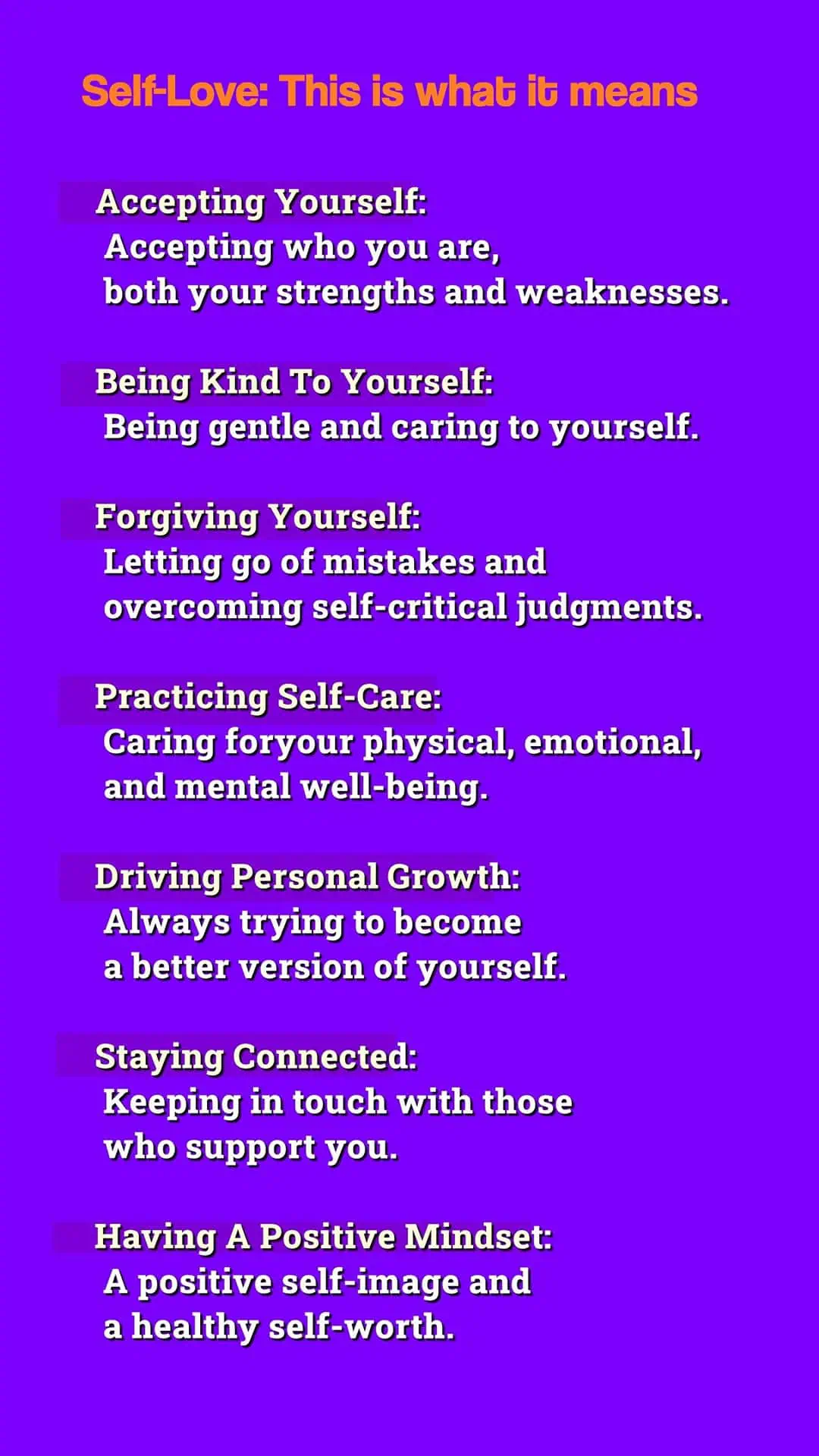Today's Friday • 7 mins read
— By Dr. Sandip Roy.
Whether you want to be happy or you have happy relationships, it is non-negotiable that you love yourself.
Not loving yourself makes it difficult to connect with and relate to others. Here’s how:
When you don’t love or accept yourself, it can hurt how you feel about and treat yourself. This negative self-view can cause issues like low self-esteem, self-criticism, or emotional pain. Which, in turn, can affect how you interact with friends, family, and partners.
Self-love is polar different from narcissistic love. In self-love, you maintain empathy and compassion towards others, qualities that narcissists don’t have.
(Self-love) is “a compassionate process of developing and practicing self-acceptance and self-care. An ongoing intrinsic process of becoming that fosters self-awareness, self-worth, wholeness, and authenticity.” — Consensus Definition of Self-Love: A Delphi Study (2021)

Learn How To Love Yourself, From Research
Here are some research-backed ways to practice self-love without being narcissistic:
1. Treat Yourself with Kindness and Compassion
Treat yourself with kindness and understanding, just as you would treat your best friend.
You deserve your kindness, especially when handling difficult situations and emotions. So, find ways to be gentle towards yourself despite your mistakes and flaws.
Self-compassion is not based on self-evaluations and comparison with others.
Rather, Self-compassion is based on the idea that failures and setbacks are part of normal life and part of common humanity. (Leary, 2007; Neff & Vonk, 2009; Neff, 2012).
People who have higher self-esteem and positive self-compassion tend to be happier and more satisfied with their lives, as this study found.
2. Show Unconditional Self-Acceptance
Self-acceptance is perhaps the most vital step to self-love. It is the act of accepting yourself for who you are, flaws and all.
It means acknowledging your strengths, but not overlooking your weaknesses, and recognizing that you are worthy of love and respect, just as you are.

Self-acceptance is the foundation of self-love. If you cannot accept yourself, it will be difficult to love yourself. However, once you accept yourself, you begin to see that your flaws are part of what makes you human.
This doesn’t mean condoning bad behavior; rather, you work on those areas, but without self-judgment.
So, stop judging yourself for your past, stop comparing your results with those of others, and accept yourself just as you are.
3. Get Rid of Your Perfectionism
Perfection is an unattainable illusion that can lead to stress and decreased productivity.
Studies show that perfectionism can lead to anxiety, depression, shame, and even suicidal ideation.
Acknowledge that it’s human to err. Use each error as a stepping stone to improve.
“Perfectionism is not the path that leads us to our gifts and our sense of purpose; it’s the hazardous detour.”
— Brené Brown
4. Value Yourself Beyond Physical Appearances
Physical appearance doesn’t define self-worth.
Valuing oneself should be based on inner qualities, such as kindness, honesty, and resilience.
Research shows that basing self-worth on external factors like appearance can lead to negative mental health outcomes.
5. Fully Experience All Emotions
Allowing yourself to feel emotions, both positive and negative, is key to understanding and accepting yourself.
“Life is like a piano. The white keys represent happiness, the black show sadness. As you go through life, remember that the black keys make music too.”
Research suggests that emotional suppression can lead to an increase in mental distress. Accepting emotions without judgment can improve mental well-being.
6. Ignore Others’ Opinions, Focus on Your Own
While feedback is important, you shouldn’t let others’ opinions define you.
“Don’t let the noise of others’ opinions drown out your own inner voice.”
— Steve Jobs
People’s opinions are often based on their own beliefs and experiences, not an objective assessment of their worth.
Maintaining your focus on self-assessment fosters self-dependence and confidence.
7. Stop Comparing Yourself to Others
Comparison can be a thief of joy.
Each person’s journey is unique. And influenced by different circumstances and experiences.
Studies suggest that social comparisons can lead to feelings of inadequacy.
The best person to compare yourself with is the you from yesterday.
This study found that women who were more responsive to personal cues experienced lower self-esteem and were less satisfied with their weight after viewing pictures of slender models.
In contrast, women who were less responsive to personal cues felt better after viewing the slender models in conventional advertising.
So, enjoy your own journey, learn from it, and reach your unique destination.
8. Cut Away Toxic People from Your Life
Toxic relationships can greatly harm your mental health. Distance yourself from those who consistently bring you down.
It doesn’t need research to show that toxic relationships can lead to stress, anxiety, and reduced self-esteem.
Prioritize relationships that uplift you.
9. Rely on Your Decision-Making Abilities
Believe in your capacity to make good decisions.
Each decision you make is based on your personal experiences and wisdom.
Your trust in your decision-making process enhances self-confidence and fosters self-efficacy.
10. Show Boldness, Build Confidence
Boldness is acting in spite of fear.
“Courage is not the absence of fear, but the triumph over it. The brave man is not he who does not feel afraid, but he who conquers that fear.”
— Nelson Mandela
Each brave action reinforces your self-belief and adds to your confidence bank.
Moreover, bold actions can lead to success, which further strengthens your self-esteem. spite of fear.
Each brave action reinforces your self-belief and adds to your confidence bank.
11. Prioritize Your Needs
Putting your needs first isn’t selfish; it’s self-care.
Self-care practices have been found to reduce stress, improve mood, and increase overall life satisfaction.
Nurturing your own needs forms the basis of a healthy relationship with yourself.
12. Seize Life’s Opportunities
“Opportunities are like sunrises. If you wait too long, you miss them.”
— William Arthur Ward
Active engagement with life’s opportunities enhances your self-esteem.
Whether it’s about professional growth, personal development, or recreational activities, dive in.
The proactive approach increases your competence and also adds to your life satisfaction.
13. View Mistakes as Growth Opportunities
Every mistake is a learning opportunity.
Instead of brooding over what went wrong, analyze your mistakes, learn from them, and adapt.
This mindset promotes resilience and a continuous learning approach.
14. Embrace Your Fears, Grow Stronger
Fear is a natural response, but it shouldn’t stop you from growing.
When you face and embrace your fears, you also find ways to build strength and resilience.
Successfully managing fears can increase personal satisfaction and overall happiness.
This study found that there was a remarkable link between self-esteem and fear of success, meaning that people with lower self-esteem were more likely to have a fear of success.
The researchers also found that there were gender differences, with female managers being more likely to have a fear of success than male managers. This is likely because women are often socialized to be less assertive and to focus on relationships rather than on achievement.
The researchers suggest that the fear of success can lead to anxiety and stress, which can hurt physical and mental health.
15. Find Beauty in Life’s Simplicity
There’s beauty in simplicity and ordinary moments.
Noticing these can foster mindfulness, appreciation, and joy.
This practice, often associated with meditation and gratitude, has been shown to have numerous psychological benefits, including increased self-love.
What Does Self-Love Mean
- Accepting Yourself: Accepting who you are, including your strengths and weaknesses.
- Being Kind To Yourself: Being gentle and caring towards yourself.
- Forgiving Yourself: Letting go of mistakes and self-negative feelings.
- Practicing Self-Care: Taking care of your physical, emotional, and mental well-being.
- Driving Personal Growth: Keep introspecting and becoming a better version of yourself.
- Staying Connected: Keeping in touch and showing empathy for those who support you.
- Having A Positive Mindset: Having a positive self-image, healthy self-worth, and a supportive and encouraging attitude towards yourself, especially in difficult times.
Final Words
Cultivate self-love, manage your fears, and find joy in life. Start today.
√ Also Read: How To Take Control Away From A Narcissist?
√ Please share it with someone if you found this helpful.
» You deserve happiness! Choosing therapy could be your best decision.
...
• Disclosure: Buying via our links earns us a small commission.

